HOGAN BASSEY AND FAMILY, 1958
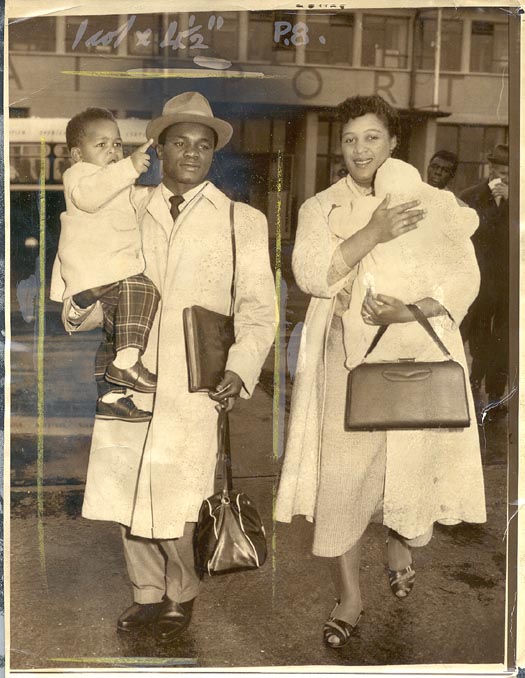
Featherweight boxing champion Hogan "Kid" Bassey with his wife
and two children travelling to the United States (1958 press photo). Bassey was the second
African to become a world boxing champion.
Dick Tiger punching speedbag
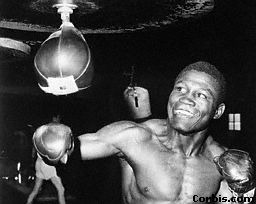
Dick Tiger punching speedbag
December 7, 1961
Dick Tiger flexes
arm
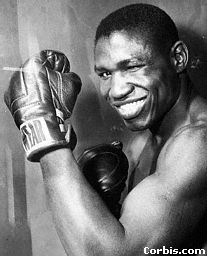
Dick Tiger poses with flexed arm and gloves
1962
Dick Tiger
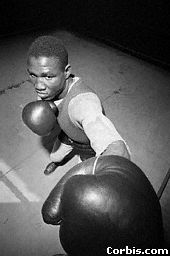
Dick Tiger high angle with glove in camera
New York
City
March 30, 1962
Gene Fullmer
Grimaces Dick Tiger Punches
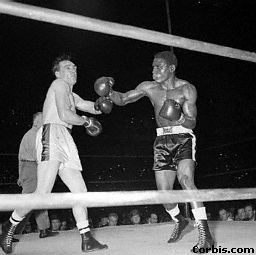
Gene Fullmer Grimaces Dick Tiger Punches
San Fransciso, California
October 23, 1962
Dick Tiger Hoisted on Shoulders
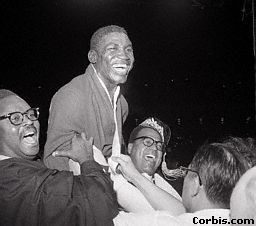
Dick Tiger hoisted on shoulders after defeating
Gene Fullmer
San Fransciso, California
October 23, 1962
Dick Tiger Lifted as Victor
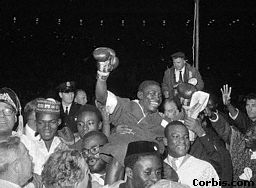
Dick Tiger lifted on shoulders for defeating
Gene Fullmer
San Fransciso, California
October 23, 1962
Dick Tiger in sweats skips rope, New York City, November 12, 1963
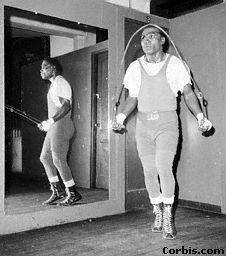
Dick Tiger in sweats skips rope
New York City
November 12, 1963
Dick Tiger fights Joey Giardello
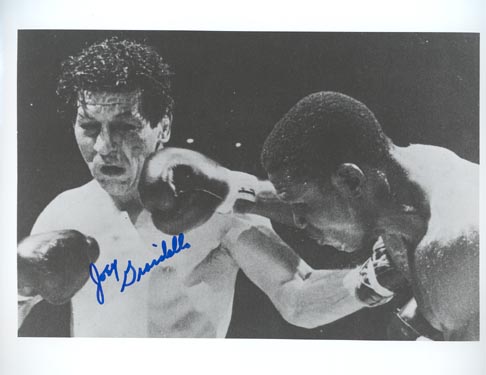
Joey Giardello in a middleweight championship fight with Dick Tiger.
Giardello and Tiger fought 4 times from 1959 to 1965, all decision affairs,
with Giardello winning the second and third fights and Tiger the first and fourth.
Jose Torres punches Dick Tiger
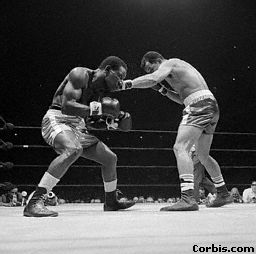
Jose Torres (right) punches Dick Tiger
New York City
May 16, 1967
Dick Tiger and Bob Foster spar
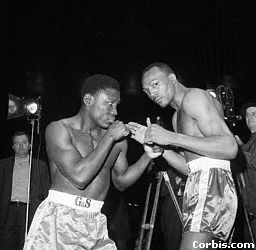
Dick Tiger and Bob Foster spar
New York City
May 24, 1968
Bob Foster punching Dick Tiger
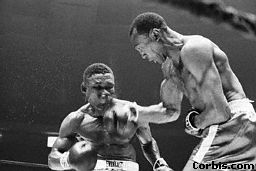
Bob Foster punching Dick Tiger
New York City
May 27, 1968
Dick Tiger knocked down by Bob Foster
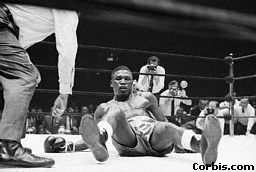
Dick Tiger knocked down by Bob Foster.
New York City
May 27, 1968
PERSPECTIVE: DICK TIGER WAS A CHAMPION IN BOTH THE
RING AND HIS AFRICAN HOMELAND
(Sports Illustrated)
At some stage of their lives, most American males idolize a sports
figure. Boxing champions lend themselves particularly well to this
form of worship. Fighters like James Corbett, Jack Dempsey, Benny
Leonard, Sugar Ray Robinson, Joe Louis, Rocky Marciano and Muhammad
Ali not only were heroes of their times but also put their unique,
mythic stamps on very different generations of male American
consciousness.
I, too, got caught up in the aura and sweep of the great champions
of my lifetime. But the one fighter I identified with -- my fighter,
in other words -- was not in the same league with Leonard or Robinson
or Louis or Ali. A knowledgeable boxing critic might rank him a cut
above ''hell of a fighter.'' However, if you judged the entire man,
boxer and human being, few could match Richard Ihetu, the African who
fought under the nom de guerre Dick Tiger.
As with many professional boxers, the last part of Dick Tiger's
life was tragic. The difference in Tiger's case is that it wasn't
boxing that took the heart out of him; it was the dream that he tried
to support with the purses he earned after he had reclaimed the
middleweight title and then won the light heavyweight championship.
Years from now, when a bunch of guys in a bar are grumbling about
a mismatch on TV and start talking about good, maybe great, light
heavyweights, Dick Tiger will not be the name they settle on; it
could be Archie Moore, Bob Foster or Philadelphia Jack O'Brien. But
if they know their boxing, Tiger's name will at least be mentioned.
Helped by a notation scrawled in a spiral notebook, I recall the
day and hour I met Dick Tiger: ''Noon -- March 10.'' The year wasn't
recorded, but it was 1965. Tiger was meeting the press that day in
his dressing room at Madison Square Garden. It was two days before he
would fight Rocky Rivero, a tough middleweight from Argentina known
for his knockout punch. It didn't figure to be an easy evening for
Tiger. He was 35, and 15 months earlier he had lost his middleweight
championship in Atlantic City to Joey Giardello on what was conceded
to have been, by everyone but Giardello people, a warped hometown
decision.
Only four or five reporters had shown up, and we waited outside
the door to a 50th Street dressing room while the tap and slide of a
jump rope sounded from inside. Chickie Ferrara, Tiger's able trainer,
opened the door, and we filed in. I had seen Tiger a couple of times
on TV; I remembered one appearance in particular, a vicious 15-round
draw with Gene Fullmer. I would never have recognized Tiger in the
flesh. He was the darkest man I had ever seen. But that doesn't
entirely describe it: There was a dusky, deep plum color to his skin,
and even where he glistened with perspiration there were gray patches
that looked dry, very much like the skin of the fruit. I stared at
the knotty, heavily muscled body. I was almost oblivious to the
questions being asked and to his answers, but not quite. Our eyes met
momentarily, and I self- consciously scribbled some words in my
notebook that make only partial sense as I read them now:
''Giardello ducking me. Jersey isn't quitting.''
The reason for the intimate press conference quickly became
apparent as Tiger gave only the briefest answers to questions about
the match with Rivero. His special quality of voice and intelligence
hit me when, in a clipped colonial British accent braided with a
tribal African lilt, he said, ''The present champion refuses to meet
me again. He has defended only one time in 15 months and again it was
in his home city. I put it that this is not a courageous posture for
a so-called champion.'' Courageous posture? My god, who was this man?
''Why,'' a reporter asked, ''did you agree to fight Giardello in
Atlantic City, knowing that it was his backyard? Especially since you
were the champ?'' ''To a certain extent, it was because of his
problem in New York,'' said Tiger. The euphemistic ''problem'' was
well understood. Giardello hadn't had a license to box in New York
since 1957. It had been revoked because of what the athletic
commission called his ''undesirable connections.'' Word was out that
Giardello's management was mob controlled, or at least mob connected.
''But that is not the entire story,'' Tiger explained patiently.
''They offered me more money if I would fight him in Atlantic City. I
do not wish to seem the mercenary, gentlemen, but this is my
livelihood. I am not utterly disappointed -- with my purse I bought
a beauty shop for my sister and a bookstore in Lagos. Yes, these are
tribal scars.''
His last statement didn't make any sense. I didn't realize he was
speaking directly to me. I had been staring at his chest. His thick
finger moved over a band of thin, vertical scars, each about two
inches long, that formed a horizontal stripe almost from armpit to
armpit. ''Tribal scars,'' he repeated for my benefit. ''All Ibo boys
receive them when they have proved their courage.''
I was surprised by his easy assumption that we would know what an
Ibo was. I guessed correctly that it was the name of his tribe, his
people. Much of the world would come to know that name soon enough --
shamefully and tragically.
''A bookstore?'' I asked. ''Why would you want to buy a
bookstore?''
He flashed a smile that revealed a gold tooth. ''Because I like to
read books. Har, har. Why else?''
Dick Tiger had not called his press conference to discuss books
or book- stores. Instead, he continued to impress upon the other
reporters his arguments about why he should get a rematch with
Giardello and why it should be soon.
His best and most practical point was that the only decent payday
available for Giardello was to fight the true champion, Dick Tiger.
If Giardello did not offer him a rematch, Tiger said that he would
step up to fight light heavyweights. The winner of the Willie
Pastrano-Jose Torres fight for that title in a few weeks would be a
real possibility, said Tiger. He also vowed that once he stepped up
in class, he would never come back down. And, thus, Giardello could
kiss goodbye a profitable return match.
When Tiger had finished his statement, a reporter asked, ''You own
a fur coat?'' The fighter's brow furrowed, and he shook his head. The
reporter went on, ''You should have one, because Giardello will give
you another shot just about the day after hell freezes over.''
There were some perfunctory questions about Rivero; then someone
asked if there was anything Tiger would like to say directly to
Giardello.
''I respect any man who is a champion,'' Tiger said. ''Truly. I do
not blame him as much as the people who are behind him. But now he
must finally act like a champion and defend against the challenger
who has the strongest claim.''
''Isn't he just waiting until you're too old, until you lose your
edge?''
''He is as old as I!'' Tiger suddenly jumped into a ferocious
boxing % position; his face contorted into a sneer, and a snarl
rolled from a curled lip. He growled ominously, ''A Tiger never loses
his hunger.'' And, just as suddenly, he transformed himself back into
the affable, relaxed man who had charmed us. There was nothing left
to say. I waited until the other reporters had left.
Tiger asked me for whom I worked. ''I'm only a stringer for UPI.
Actually, I'm an English teacher,'' I said.
''Have you read Animal Farm?''
''Orwell?''
''Of course, Orwell.''
We spent the afternoon together, talking a bit about Orwell but
more about the implications of Animal Farm and the terrible pitfalls
of revolutionary politics. He seemed to have a personal interest. He
showered and dressed. His brown suit was on the shabby side, the
jacket a shade lighter than the pants; his black shoes had gray
scuffs. We walked briskly down Eighth Avenue. He was carrying a
heavily twined package that he wanted to go out in the afternoon
mail. It was destined for Aba, Nigeria.
I couldn't believe that, less than an hour after I had met him, I
was walking in Manhattan with the former middleweight champion of the
world. I assumed passersby recognized the celebrity and, by strong
association, me, too. In truth, almost no one noticed us. Those who
did happen to glance our way might have assumed that we were a
middle-aged black delivery man and a winded white intellectual.
The Ibo tribal scars on his chest, Tiger told me as we wove
through the crowds, were made by a very sharp, very hot knife when he
was 10, unusually young for the initiation. No, they didn't hurt
particularly. Then he corrected himself: An Ibo boy did not allow
them to hurt. When we were finally forced to stop for traffic, Tiger
looked at me carefully and said, ''The politics of my country are a
cause of great concern to me. There could soon be civil insurrection.
The situation is classically Orwellian.''
All the way to the post office and then back uptown he explained
the volatile situation in his homeland. ''Although we are not the
majority,'' he said, ''my people have held leadership in Nigeria
since the British left. In recent years, military elements have taken
control. We Ibo are not basically a militaristic people, but we will
not permit ourselves to be shunted aside. Without the Ibo, my country
would be a disaster.''
Then he said something that all these years later I recall with
clarity even though I hadn't written it down, perhaps because events
have since conspired to underline its bitter irony. ''Our opponents
call the Ibo the Jews of Africa. It is meant as an insult. I
interpret it as a high compliment.''
A few blocks farther north -- we were now on Tenth Avenue -- Tiger
stopped in front of a tailor's shop. He went inside, and I followed.
He pulled off his suit jacket and showed the man behind the counter a
long tear in the satin lining. The owner persuaded Tiger that it
would be better to select a secondhand jacket from the racks in the
rear than to have his own jacket repaired. Tiger and the tailor
disappeared. When they returned, Tiger was wearing another brown
jacket, a shade darker than the pants this time. The man wanted $5.
They settled on $2.50, his old jacket and a ticket to the Rivero
fight.
That bout proved remarkably easy for Tiger. Rivero was paunchy and
moved as though he were fighting underwater. Every punch he attempted
was of the KO variety. Tiger was hit cleanly just twice in 5 1/2
rounds. The referee stopped the fight in the sixth after Rivero had
been knocked down for the first time in 54 professional fights. Tiger
must have known that Rivero was just showing up for a payday.
He stayed busy after Rivero with a big win against rugged
''Hurricane'' Carter. If Giardello's people were waiting for age to
catch up with Tiger, it didn't seem to be happening. It is true,
however -- and all experienced fight people know it -- that a fighter
usually becomes old overnight. One fight, he has it all; the next,
nothing. Call it the Dorian Gray syndrome. Sometimes that change
takes place during a fight. Sometimes a fighter can lose it in a
single round. Maybe some sign of deterioration was what Giardello's
people were looking for. Maybe Tiger was foolish for not showing it
to them by fighting a little below his top level, but he was, after
all, an Ibo and proud.
On the boxing beat, word was that if it were up to Giardello
alone, he would have fought Tiger a year ago, that he wasn't really
such a bad guy. The problem was his management. They weren't going to
risk this championship with a tiger like Tiger. They knew Tiger was
already having trouble making the weight: he had come in five pounds
over the limit for Rivero. The thing that must have really thrown
them was that the Nigerian, for all his threats, still refused to
take on legitimate light heavyweights.
The scuttlebutt also had it that when they felt Giardello had one
good fight in him, and if Tiger was still available, they would shoot
for that last, nice payday and, who knows, maybe even go out a
winner. The consensus among experts was that Giardello, although not
a big hitter, could still do a good deal of cumulative damage to a
fighter as stationary as Tiger.
Then Giardello got rid of his manager and was given a license to
box in New York. A title match with Tiger in October 1965 was made
for Madison Square Garden. Giardello, as champion, dictated the
terms: $50,000 or 40% of the gate (live and home TV) while Tiger
would get $15,000 or 20%. I asked Tiger about the split, and he
said, ''He takes the lion's share, but I will take the Tiger's.''
His wit might have caused him to smile in self-appreciation, but it
didn't. He was frowning. There was trouble at home, he told me. He
had been sending every penny there to help the Ibo cause, but he was
worried about his family, his property, and particularly about his
ability to concentrate on this crucial boxing match, 5,000 miles from
the place and people that mattered most in his life.
''The world is never without its ironies,'' said the man with
tribal scars. ''Orwell understood that.''
During the week before the fight there was heavy betting. The
early money liked Giardello at 6 to 5. Then Tiger support came in,
and it was ''pick 'em.'' Then it was Tiger at 6 to 5; then, two days
before the bout, 8 to 5 Tiger. By fight time the odds were down to 7
to 5 Tiger.
More than 17,000 fans showed up at the Garden and paid more than
$160,000, so both fighters were sure of earning a lot more than their
guarantees. Frank Sinatra was supposed to be there. Mickey Mantle and
Yogi Berra had already been seen. I spotted Sugar Ray Robinson and
Rocky Graziano. There were more men in evening jackets and women
wearing furs than I had ever seen before at ringside.
And certainly more Africans than I had seen anywhere before. They
paraded through the crowd, some of them in tribal robes whose colors
had such a dark intensity about them that they made the garments seem
not only exotic but vaguely dangerous. Most of the men wore flat
hats with golden tassels.
Tiger came out first from the 50th Street side, and with his
appearance a large West African drum began to thunder rhythmically
from the darkness at one end of the arena. Its beat was alien but
compelling to the huge crowd of New Yorkers. They clapped and
stamped out a march beat, but the drum dominated the arena, as
foreboding as the drums in The Emperor Jones.
The fighters both weighed the precise limit of 160 pounds, but
Tiger was two inches shorter. Above his white trunks, Tiger's body
was massive. Giardello seemed pink and soft by comparison; his dark
trunks made his body seem even paler.
At the bell, Tiger rushed across the ring and met the champ before
he was two steps out of his corner. Tiger threw punches that backed
Giardello against the ropes. A surprise tactic. Tiger had always been
a very cautious starter, especially in a 15-round fight. Giardello
couldn't get off the ropes and was taking solid body shots.
Significantly, each time Giardello smothered Tiger's attack and
appeared to hook the dark arms, referee Johnny LoBianco quickly
stepped in and had them fighting again. That favored Tiger. His
fists worked Giardello's softening body. The great tribal drum
thundered. Before the first round was over, Joey Giardello had
become an old fighter.
To his credit, Giardello didn't let it become a rout. No, it
wasn't a great fight, but it went 15 rounds and it was very
interesting. The decision was unanimous. I scored it nine rounds to
six. Dick Tiger was champion again. Africans in green- and-purple
robes leaped into the ring carrying a banner that read BIAFRA MUST
LIVE. Few in the Garden understood its meaning.
After that fight Tiger had an increasingly difficult time making
the middleweight limit. Also, he had developed a pain in his lower
back and right side, a result of the Giardello fight. Eventually, the
presence of blood in his urine became commonplace. Nevertheless,
Tiger defended his middleweight title against Emile Griffith in 1966.
Weakened by pain and by the debilitating need to lose weight to meet
the limit, he lost a split decision. Then, eight months later, on
Dec. l6, he made good at last on his threat to move up into the light
heavyweight class. He won the championship easily by a decision over
Jose Torres.
He didn't stay long in the U.S. to enjoy it. There was great
trouble at home. The Ibo of eastern Nigeria had seceded from the
central government. They called their new country Biafra. The civil
war that followed became a rout. The Biafrans appealed for arms, for
aid. None was forthcoming: The Nigerian central government controlled
the army -- and the oil -- in black Africa's richest
petroleum-producing country.
Tiger returned to Biafra to fight another African in an exhibition
match at Port Harcourt, a few miles from his home in Aba. It was a
glorious day for the Ibo, and Tiger donated his purse to the
Biafran rebels. Later he would donate even more when, as a
38-year-old father of seven, he volunteered in the army of Biafra.
As a second lieutenant, he trained soldiers in physical exercises.
After his exhibition bout in Biafra, he returned to New York and
gave Torres a rematch at the Garden. Like their first fight, it drew
a pretty good crowd, and Tiger, giving away about 10 pounds, again
won by a decision. But this was the only touch of triumph in Dick
Tiger's life then. The ''Jews of Africa'' were being slaughtered. He
could get no word about the fate of his family. (As he later learned
that they were either dead or imprisoned.) He could not go home. His
properties in Lagos had been confiscated -- his apartments, his
service station in Aba, the beauty parlor and cosmetics shop, the
bookstore, the Mercedes, the tens of thousands of dollars saved by
the man in secondhand suits -- all were gone. Biafra, the dream, was
gone, too.
And soon -- too soon -- his title was also gone. In May 1968,
Tiger was knocked out two minutes into the fourth round by Bob
Foster. It was the only time Tiger had ever been knocked out. Perhaps
he should have quit then. The painful spasms in his lower back came
more frequently, but he couldn't quit. He was a political exile in
New York. He had no other salable skill.
Tiger fought four more bouts in New York, winning three and losing
one, a 10-round decision to Griffith. The fights gave him just enough
money to live on. After retiring in 1971 he worked as a porter at the
American Museum of Natural History, commuting by subway from a
furnished room in the Bedford- Stuyvesant section of Brooklyn. In
October 1971 he was stricken at work by stabbing pains in his back,
right side and abdomen. It was an attack so severe that he fell to
his knees. He was taken to St. Vincent's Hospital in Greenwich
Village for observation.
No treatment was possible. He had cancer of the liver, acute and
advanced. He told me, ''The United States is a very good country, a
very nice country, but Biafra is my home. I will die in Biafra.''
Technically speaking, in 1971 no such place existed. But the
Nigerian government permitted Tiger to return to Aba, to his Ibo
home. For days after his return, thousands of visitors -- mourners,
really -- from miles around walked the hot, dusty roads to Aba. When
they found Dick Tiger's house, they saw a muscular but pain-withered
boxer sitting in front, in the shade of a solitary acacia tree. He
died on Dec. 14, 1971. END
Copyright 1986 Time Inc.
SAM TOPEROFF Sam Toperoff's ''Sugar Ray Leonard and,
PERSPECTIVE: DICK TIGER WAS A CHAMPION IN BOTH THE RING AND
HIS AFRICAN HOMELAND. , Sports Illustrated, 10-13-1986, pp 10.
BOXED INTO A CORNER
(Africa News Service)
Boxed Into A Corner
Lagos (Tempo, November 12, 1998) - Once the pride sport in Nigeria,
Boxing in the past two decades has declined steadily. Dieing with the
sport are its heroes most of whom now live in abject poverty and
neglect. Jacob Ajom met one of the relics of Nigeria's boxing glory
Kabiru Akindele in the throes of hunger and desperation
Hagard-looking, stern-faced with blood-shot eyes, he gallops in the
roped square, punching his tight fists in the air like one of the new
era spiritual soldiers of the pentecostal church. His fading track
suit, originally light blue with single deep-blue side stripes, now
wears a dark, muddy, brownish colour. His hair is bushy and his once
white training canvas are completely caked in dust. Suddenly, on
sighting this reporter, the man stopped his shadow-boxing and moved
towards his 'predator' to get a closer view. He wore an unkempt hair.
Casting a direct, determined look at the intruder and through his
sweat-dripping lips, he demanded, "Yes, oga, what can I do for you?"
Not getting an immediate response from the awe-striken reporter, he
sighed and turned away to a remote corner of the National Stadium
boxing gym, and sat on a desk. Sitting there, he looked tough and
determined, yet forlorn. Kabiru Akindele, a former national and West
African featherweight champion and number one contender for the African
and Commonwealth titles exuded anger, bitterness and frustration. His
lot has been that of rejection and abandonment by a country he has
spent the better part of his productive years for. Professionally, he
looks finished, but at 45, Kabiru believes strongly in his ability. The
former champ, who lost his title, due to inactivity in 1995, looks
forward to rediscovering his form to become a champion again.
The sad story of Kabiru Akindele is a reflection of the fate of
Nigerian boxers. Once the pride of Nigerian sports administrators and
numerous fans who thronged the sports hall to watch his fights, the
present situation of the boxer gives no idea of the past glorious days.
He's now hungry, jobless and on the verge of being ejected from his
place of abode.
His fortune is a sharp contrast to the opulence, comfort and millions
of dollars that his American counterparts can boast of. While the
American pugilist makes millions of dollar out of his talent and name,
coming in and out of retirement, this cannot be said of the Nigerian
boxer. Battered, underfed with little medicare during the heady days of
stardom, the boxer rarely has much left after a few years in the
limelight. The brain is grodgy and the body is meak. But he must
continue if he must survive. "I have lost my job," Akindele, wipping
his drenched forehead with the back of his palm, said. Continuing with
rehearsed deliberation, Kabiru, who, for decades fought in the colours
of the P & T Boxing Club (Now Nipost), said, since he lost his job, he
has been living in penury." I have not been paid my gratuity and nobody
says anything about it again."
Simply put, Kabiru has been reduced to the lowest dreg of the society.
While he awaits the payment of his gratuity from the Communications
Ministry, he has to make ends meet. Thus he works as an agbero (tout)
at the motor-park. He is paid a commission of between N5 and N20 for
his efforts, an amount that hardly can keep body and soul together.
Kabiru's ordeal is a reflection of the lot of former Nigerian boxers.
Most active Nigerian professional boxers can hardly meet their daily
basic needs-though with promising potentials, they are left in the
lurch as promoters shun them. Without fights, they definitely can't
make money. Paul Onwuachu, a national boxing coach, observed that "this
situation has put our boxers in a very desperate position, and made
them vulnerable."
The coach added that Nigerian boxers' conditions have made them to be
so cheapened that they could jump at any fee for fights both within and
outside the country. "Once a promoter dangles any figure before them,
they see it as an opportunity to eke out a living and perhaps catch the
eye of another promoter." Retrospectively, Nigerian boxing has come a
long way. Before the country's attainment of independence, Hogan 'Kid'
Bassey and Dick Tiger (both now of blessed memory), had caught the
attention of the world by becoming world champions. Unfortunately,
since those pre-independence landmarks, Nigeria has almost vanished
from the international boxing scene. No Nigerian has won any major
title in the paid ranks in recent times. Bash Ali's was the lone
crusader in Europe and even then his claim were quite questionable.
Obisia Nwankpa, Eddie Ndukwu, Dele Jonathan, Hogan Jimoh, Davidson
Andeh, Joe Lasisi and a host of others sparkled for a while winning the
West African, African and Commonwealth titles at different times. Some
of them raised the hopes of their compatriots for at least another
world title, but such dreams were never fulfilled.
"World titles will continue to elude us for as long as we abandon our
boxers to the machinations of foreign promoters," coach Onwuachu said.
"No Ghanaian or American would want to promote a fight that will
produce a Nigerian champion. No matter, except by knockout." Though the
boxers have complained of neglect, the consensus of boxing buffs is
that Nigerian boxers are generally lazy. "Most of them are not ready
for the hard work that will get them into the shape that past fighters
such as Eddie Ndukwu, Obisia Nwankpa, David Andeh and others attained.
Like the physician, the boxer must first heal himself.
Publication Date: 19 November, 1998
Copyright 1998 Africa News Service (via Comtex). All rights reserved
Author not available, BOXED INTO A CORNER. , Africa News Service, 11-12-1998.
I'LL ALLOW MY KID TO BOX
(Africa News Service)
I'll Allow My Kid To Box
Lagos (Tempo, March 25, 1999) - Once the toast of the boxing world,
Obisia Nwankpa spends his time away from fame, training young boxer's.
PETER DEMEYIN reports on the ex-boxer's exploits in the ring, his
regrets and projections He didn't look any different from the
generality who came to eat at the bukas that dot the mainbowl of the
National Stadium.
The fact that he was engrossed in his meal ("Apu" and Egusi soup) made
him more anonymous. The surroundings and his entire mien never gave an
inkling to his past.
Nobody gave him more than a casual glance and a solitary hello. It was
a far cry from the fame and popularity he enjoyed in the '80s. Then he
was the toast of not only the boxing world, but many fans and admirers,
especially ladies.
Then he was the real Obisia Nwankpa. Though his name was not changed,
he is no longer the Obisia Nwankpa of old. The old Obisia Nwankpa was
boxing champion who won many laurels and championships within and
outside Nigeria, high point being a shot at the world lightweight title
then held by Seoul Mamby.
That was in 1981. He enjoyed the blitz and glamour of boxing. Today,
Obisia evokes pity. He lives a life of near destitution. Neglected and
unsung, Obisia has resigned himself to fate.
"In Nigeria, people don't know how to celebrate their heroes. Rather,
they seize every opportunity to denigrate them. You should help tell
the public that Obisia Nwankpa is alive, hale and hearty." Obisia, who
speaks Yoruba very fluently, would not strike you as an average Igbo
man, despite hailing from Isialamogwa Local Government Area of Abia
State. Having been born in Lagos to Mr. and Mrs. Mathias Nwankpa in the
early '50s might be responsible for the ex-boxer's very "Western"
manners and accent. The former number one contender to the lightweight
crown of the world is one of the many Easterners whose education was
cut short due to the civil war of 1967-70.
"Even if I had gone to the university, I wouldn't have had the type of
fulfillment boxing provided me. When you talk of money and honour, I
had them in boxing. Again, boxing accorded me the opportunity to
travel to over 50 different countries in different continents. What
else do I want in life?"
Considering his antecedents, that Obisia fought for a world title is a
miracle in itself. He started boxing at Makpara Approach School, a
reform institution for children of Igbo men captured and adopted by the
federal government forces during the civil war. Between 1967-70, he was
the boxing champion in the school. For seven years, 1970-77, Obisia
fought in the amateur ranks in the colours of the Nigerian Army.
He joined the force as a corporal. Inspired by the late Dick Tiger and
Hogan Kid Bassey, Obisia won many laurels in the amateur ranks which
included gold medals at the 1973 All-African Games and the 1974
Commonwealth Games in New Zealand. When he turned professional in 1977,
it didn't take long for Obisia to establish himself as a force in the
paid ranks on the local scene.
In what he regarded as his toughest fight, Obisia remembers his clash
with Davidson Andeh. "My fight with Andeh, who was the reigning
lightwelter weight champion was a thriller, indeed. Most people didn't
expect me to win but I knocked him out in round eight. Andeh resigned
from boxing the following day."
Having won the African and Commonwealth titles by defeating Degis
Lorents and Jeff Malcomm respectively, the stage was set for Obisia to
have a crack at the world light weight crown held by Seoul Mamby of
America.
The fight was billed for Lagos. Before then Obisia had beaten many
boxers in their backyards . They included Englishman Chris Davis, Mike
Abbay of Guyana, Mika Hayana of Pueto Rico and Argentine Joan Gumene.
The world title fight against Seoul Mamby was to mark the turning point
in the career of Obisia.
Recalling the fight, Obisia's voice was laced with emotions tonged with
regret. "Before the fight, during training, I always weighed every
morning. nd myself and my British manager calculated that I weighed 65
kilograms. But before the fight, at the weighing in, I was one kilogram
overweight, which means I had to shed the extra weight by physical
training. Despite the weight problem, Obisia went to give a good
account of himself.
He recounts the tense moments after the fight: "After the fight, it
took the judges one and a half hours to announce the result. It was 2-1
against me. The two American judges gave it to Mamby, and the French
judge gave it to me. The bout was a charade." Asked what happened to
the banned substance caught with Mamby in the seventh round, Obisia got
visibly furious:
"I don't like talking about that fight because it was day light
robbery. From the video clips, I dominated the first seven rounds while
we shared two other rounds. How they came about the verdict I don't
know. I don't know why the NBB didn't follow up my protest." The defeat
marked a turning point in the life of Obisia. He was beaten twice by
Billy Famous, and to aggravate his woes, Obisia was dismissed from the
Nigerian Army for allegedly raping a minor. He refused to comment on
the rape charge. "I don't want to open old wounds," he declared.
Though Obisia collected $50,000 for the world title fight, and
generally made money during his career, his present state leaves much
to be desired. How did he spend his money?
"I think it would be foolish to ask me how I spent my money. Have you
seen anybody who made money and spent it on sand? I invested some of
the money on projects and some members of my family. Many people made
more money and are broke today. Didn't you hear about Muhammed Ali.
Even Pele was broke at a time. It's not peculiar to me."
Now a boxing coach, the father of three boys and four girls says he
would allow any of his kids, male or female, to take to boxing. His
priority now is to help young boxers excel in the forthcoming All
African Games and the Sydney 2000 Olympics.
Publication Date: April 1, 1999
Copyright 1999 Africa News Service (via Comtex). All rights reserved
Author not available, I'LL ALLOW MY KID TO BOX. , Africa News Service, 03-25-1999.
Akinwande gets huge chance to shake image as gentle giant
(USA Today)
NEW YORK -- If size really did matter, wow, can you imagine the swath
of menace Henry Akinwande would rip through the heart of the heavyweight
division, much less Evander Holyfield, Godzilla or a rush-hour Manhattan
taxi snarl?
Six-feet-seven. Nearly 250 pounds. He has the size to stalk, the jab
to punish. In theory, Akinwande should possess the paralyzing punching
power of George Foreman during his '70s heyday (the decade, not the
big fella's age).
Alas, Akinwande is boxing's gentle pterodactyl, more prone to flight
than fight.
The fighter's 86-inch wing spread is reputed to be the longest in
the sport since Italian giant Primo Carnera roamed the canvas more
than 60 years ago.
But his attention span for matters violent is one of the shortest.
Ultimately, that is what Holyfield, the littlest, bravest heavyweight
warrior, relies on Saturday night in their championship battle at
Madison Square Garden.
``It's obvious he can feel (intimidated), that's the way he looked
against (Lennox) Lewis,'' Holyfield says.
That's why Akinwande doesn't stand tall with fight fans. Only 10 months
ago, referee Mills Lane -- an ex-Marine unable to stomach the sight
of a grown man refusing to fight -- disqualifed Akinwande in the fifth
round for repeatedly clutching WBC champion Lewis.
``If he had beaten Lewis, I would've called him `Henry the First,'
'' says boxing scribe Colin Hart of The (London) Sun. ``As it turned
out, he was `Henry the Worst.' ''
Akinwande, son of a middle-class Nigerian businessman, became known
as Huggin' Henry. This despite displaying the kind of terrorizing
power forward frame that Chicago Bulls coach Phil Jackson would pay
untold millions to lay on Karl Malone of the Utah Jazz this week.
But where's the attitude?
``People say I have no guts, I have no heart,'' Akinwande says. ``They
do not know what I went through in my life.''
In less than two months, new trainer Emanuel Steward -- who supplanted
Don Turner, who also co-trains Holyfield with Tommy Brooks -- has
faced an enormous task in attempting to transform Akinwande's passivity.
As with many fighters, Steward says ``a lot of Henry's problems are
mental,'' brought on by his own insecurities.
``That's why I'm here,'' Akwinande says. ``To prove something.''
To himself. To the public. To his parents, who pleaded with him not
to get involved with boxing as a teen-ager. And to the great many
Nigerian athletes of his homeland, from the memory of middleweight
Dick Tiger to the present-day wonder of Hakeem Olajuwon.
Akinwande has come a long way from his job as a street sweeper in
south London, after he left home at 15 against his father Joseph's
wishes.
``In Africa, they look down on you if you get into sports,'' he says.
``The father tells you everything to do, even if you're 30. When he
found out I was boxing, he nearly killed me. He said I wasn't his
son anymore.''
They've since repaired the relationship. Saturday, Akinwande tries
to do the same with the public.
``My destiny,'' he says knowingly, ``is my hands.''
Copyright 1998, USA TODAY, a division of Gannett Co., Inc.Jon Saraceno, Akinwande gets huge chance to shake image as gentle giant. , USA Today, 06-03-1998, pp 13C.
Philip Emeagwali
RECOMMENDED READING
He is an Intellectual Inspiration
Can Nigeria Vault into the Information Age?
CYBERSPACE GOSSIPS
You can read and/or join the following uncensored discussion threads:
Note: Pages will open in a new browser window.
GUESTBOOK ENTRIES
YOUR COMMENTS ON THE BIAFRAN WAR
Search : We have 1000 homepages on this web site.

